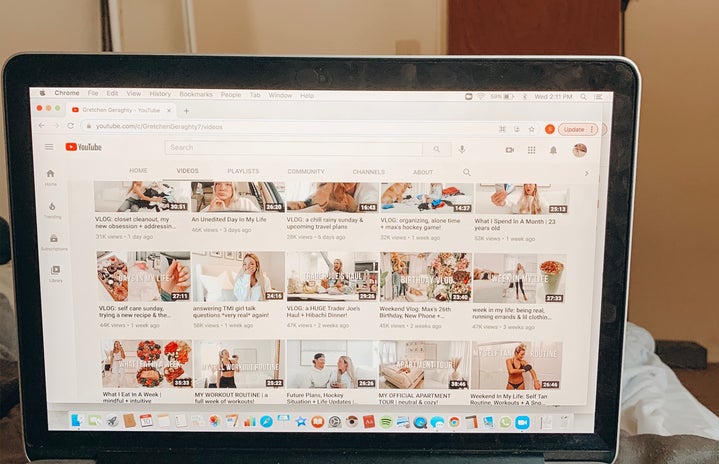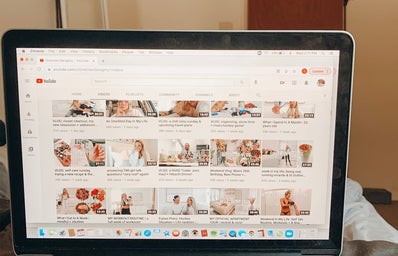As someone who grew up right when the online-media boom occurred, I can genuinely say that I am glad I did a majority of my ‘growing-up’ in a time before Youtube and Instagram or else there would be far cringier content of me on the internet. While I got my first Instagram account at the age of 14, my parents would not even sign on to any social media site until a few years after meaning that a majority of my younger-year, ‘cringey-stage’ photos have been kept from the internet and I was able to define myself and my internet presence on my own, consensual terms. With the rise in online content-creation, many children growing up in a media-centric world are unable to say the same, and the lines between what is acceptable to share to strangers online and what is not has seemingly become blurred for family content creators.
What brought this to my attention more than anything is a TikTok account of a single-mother of twins whose following has seemingly exploded in recent months. This account has nearly 7 million strangers, at the time of writing, all following the daily lives of this mother and her children. There are videos putting the twins to bed, giving them baths, feeding them, etc. While this seems harmless on the surface two major problems arise. One, fans of this creator and her children have started to overstep casual enjoyment into obsessive territory with comments such as, “It has been six hours since you have posted and I am having withdrawal from our babies!” and “Here for my daily child support.” These types of comments fill up the creator’s page, with strangers online getting obsessed with children who do not have the understanding or ability to consent to their image being shaped online from the moment they were only a few months old. Further, this question of consent factors into a lot of the discourse surrounding the ideas of family content creators. If a child is too young to speak or to grasp the concept of the internet should every moment of their lives be published online? Even more than this, if the entire focus of your content is your children are they being compensated as such?
With child actors, there are unions set up and laws in place to prevent money that is rightfully a child’s earnings to be taken unjustly from them, to prevent long work hours, and to prevent exploitation and abuse. With the child ‘stars’ of these family content channels or accounts not working for major companies that are forced to follow the laws in place, many of these children fall through the cracks of exploitation. The money these channels receive goes to the parents with no regulations in place to make sure the child sees a percentage and if the content is being filmed in the home, these ‘child-actors’ never have a set work schedule. They are expected to be ‘on’ and ready to film any time of the day with no separation between work and home; the effects of this lifestyle and schedule on these children are still unknown.
On January 18th, 2022 a new legislative bill was proposed in the state of Washington by Representatives Wicks, Berry, Sells, Senn, and Eslick on the protection of minors who appear in online content channels. This bill addresses two major concerns, echoing the concerns of this article stating, “Those children are generating interest in and revenue for the content, but receive no financial compensation for their participation. Unlike in child acting, these children are not playing a part, and lack legal protections,” and “In addition to a severe loss of privacy, these children receive no consideration for the use and exchange of their personal property rights.” If passed, this bill will regulate family content creators with minor children and will require that children are compensated financially via the amount their name/image is shown compared the full length of a video, upon the age of majority an individual may request the deletion of any content featuring themselves as a minor and will be granted this request, and any licensing rights tied to a minor individual will belong to the individual solely at the age of majority.
If this legislation passes and is put into place, the way family vlogging is in its current form could change drastically. Limits could be made law that stop children from being exploited with time or financial gain and autonomy could be held, to some degree, by the children involved.
Do I believe all content featuring children is bad online? No. I think influencers showing a picture of their newborn or an image here or there of a child in a family photo is entirely normal and non-harmful. However, I do believe that if the entire point of a content channel is the filming and lives of minors is when exploitation should be considered and questioned. Like with Hollywood in which dubious activity revolving minors still takes place despite laws against it, I do not think this bill passing would completely eliminate child exploitation in the digital age. However, I do believe that this becoming law would highly benefit minors who have had their lives broadcasted to strangers without consent for years and allow for some positive regulation in an uncertain internet-era.


